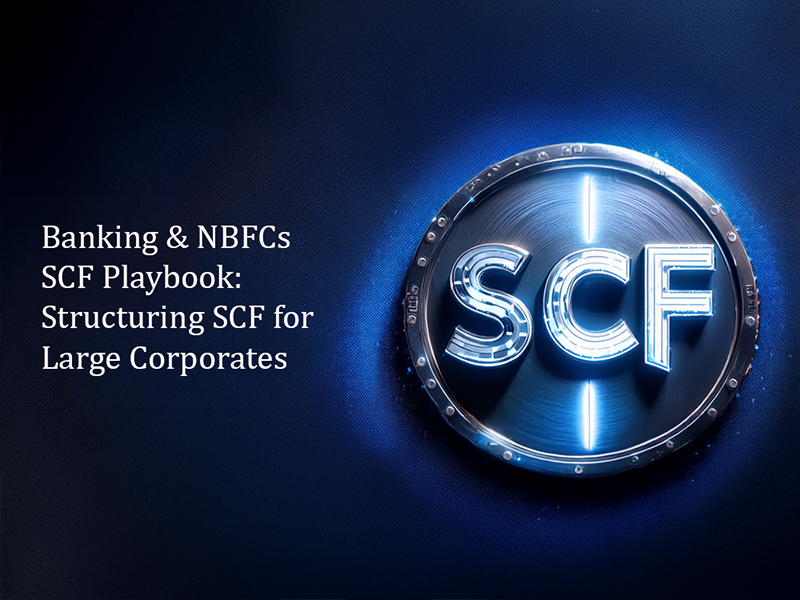BlogFeb 02, 2025
The Ultimate A to Z Glossary of Supply Chain Finance (SCF)
- Accounts Payable (AP): Money a company owes to its suppliers for goods or services received.
- Accounts Receivable (AR): Money a company is entitled to receive from customers for delivered goods or services.
- Anchor Buyer: A large, creditworthy company that facilitates SCF programs for its suppliers.
- Asset-Backed Lending (ABL): Loans secured by company assets such as receivables or inventory.
- Assignment of Receivables: A process where a business transfers the rights to its receivables to a financier.
- Bank Payment Obligation (BPO): A digital payment guarantee between banks in trade finance.
- Basel III: A set of international banking regulations that impact SCF by affecting capital requirements.
- Blockchain in SCF: A decentralized ledger technology used to enhance transparency in SCF transactions.
- Buyer-Led Financing: A financing model where a buyer supports its suppliers' working capital needs.
- B-SCF (Business Supply Chain Finance): A structured SCF solution designed to optimize cash flow and mitigate risks.
- Cash Conversion Cycle (CCC): The time taken for a company to convert its investments in inventory into cash flows.
- Collateral: Assets pledged by a borrower to secure financing.
- Confirming (Supplier Payment Services): A financial service where a buyer ensures early payment to suppliers through a third party.
- Credit Insurance: A policy that protects businesses against non-payment risks.
- Crowdfunding for SCF: A method where multiple investors finance trade receivables.
- Deep-Tier Finance: Extending SCF to lower-tier suppliers beyond direct vendors.
- Dynamic Discounting: A mechanism where suppliers offer flexible early payment discounts to buyers.
- Debtor Finance: Financing secured against unpaid invoices.
- Digital Trade Finance: The use of technology to automate and streamline trade finance processes.
- Discounting: Selling invoices at a discount before their due date to improve cash flow.
- Early Payment Program (EPP): A program where buyers pay suppliers before invoice due dates at a discount.
- Electronic Bills of Exchange (e-BoE): A digital version of traditional bills of exchange.
- EIPP (Electronic Invoice Presentment and Payment): An automated process for invoicing and payments.
- Export Credit Agency (ECA): A government-backed institution that supports trade finance.
- ERP Integration in SCF: The linkage of SCF solutions with enterprise resource planning systems.
- Factoring: A financial arrangement where businesses sell invoices to a third party at a discount for immediate cash.
- FinTech in SCF: Technology-driven companies providing innovative SCF solutions.
- Floating Charge: A security interest in a company's assets that changes over time.
- Forfaiting: The purchase of export receivables without recourse to the seller.
- Fourth-Party Logistics (4PL): Outsourcing SCF management to a strategic logistics provider.
- Guarantee: A financial instrument assuring payment in SCF transactions.
- Green SCF: Sustainable financing solutions to promote environmentally responsible supply chains.
- Government-backed SCF Programs: State-supported initiatives to boost SCF adoption.
- Gross Margin Return on Inventory (GMROI): A measure of supply chain profitability.
- GST Impact on SCF: The influence of Goods and Services Tax on invoice financing.
- Hedging in SCF: Using financial instruments to mitigate risks such as currency fluctuations.
- Hybrid SCF Models: A combination of different SCF approaches for optimal flexibility.
- High-Frequency Trading in SCF: Using advanced algorithms for real-time trade finance decisions.
- Holistic SCF: End-to-end financing solutions covering all supply chain participants.
- Holding Cost in SCF: The cost associated with storing inventory before sale.
- Invoice Financing: A form of SCF where businesses get advances on their unpaid invoices.
- Invoice Hub: A centralized digital platform for invoice verification and financing.
- Interest Rate Risk in SCF: The risk of rate fluctuations affecting financing costs.
- Inventory Financing: Using unsold inventory as collateral for loans.
- International SCF Platforms: Cross-border SCF solutions facilitating global trade finance.
- Just-in-Time Financing (JITF): Providing SCF solutions that align with just-in-time inventory management.
- Joint Ventures in SCF: Strategic collaborations to develop innovative SCF solutions.
- Judicial Recovery in SCF: Legal mechanisms for debt collection in trade finance.
- J-Curve in SCF: The trend of initial negative cash flow in financing, followed by long-term gains.
- Job-Order Financing: SCF tailored for businesses operating on a project basis.
- KYC (Know Your Customer) in SCF: Compliance processes ensuring transparency in SCF transactions.
- Key Risk Indicators (KRIs) in SCF: Metrics for assessing financing risks.
- Kinetic SCF: Agile financing models adapting to real-time supply chain dynamics.
- KPI-Based SCF: Performance-driven financing solutions linked to key performance indicators.
- Knowledge-Based Credit Scoring: AI-driven credit risk assessment for SCF.
- Letter of Credit (LC): A bank-issued financial instrument guaranteeing payment in trade transactions.
- Liquidity in SCF: The availability of cash to fund supply chain operations.
- Logistics Finance: SCF solutions tailored for the transportation and logistics sector.
- Lending-as-a-Service (LaaS) in SCF: Cloud-based lending models enabling seamless SCF transactions.
- Loan Origination System (LOS) in SCF: Technology-driven platforms for managing SCF loan applications.
- Margin Financing: Leveraging trade margins for working capital.
- Multi-Tier SCF: Extending financing beyond first-tier suppliers to second and third-tier participants.
- Machine Learning in SCF: AI-driven credit assessment and fraud detection.
- Manufacturing Supply Chain Finance: Financing solutions specific to production industries.
- Microfinance in SCF: Small-scale SCF solutions for MSMEs.
- Non-Recourse Factoring: Invoice financing where the lender assumes credit risk.
- Neo-Banks in SCF: Digital banks offering specialized SCF services.
- Net Terms: Payment terms negotiated between buyers and suppliers.
- NBFCs in SCF: Non-Banking Financial Companies facilitating supply chain lending.
- Network Effect in SCF: The impact of a larger ecosystem on financing efficiency.
- Obligor in SCF: The entity responsible for repayment in a financing agreement.
- Open Account Trade: A trade finance model where buyers pay after receiving goods.
- Order-to-Cash (O2C) Cycle: The entire process from order placement to payment collection.
- Operational Risk in SCF: Potential disruptions affecting financing transactions.
- Optimized Working Capital: Maximizing liquidity efficiency through SCF.
- Platform-Based SCF: Digital marketplaces for trade finance solutions.
- Purchase Order (PO) Financing: Short-term funding based on confirmed purchase orders.
- Post-Shipment Finance: Financing extended after goods are shipped.
- Pre-Shipment Finance: Funding provided before goods are shipped.
- Predictive Analytics in SCF: AI-driven insights for demand forecasting and financing decisions.
- Quantum SCF: The use of quantum computing in supply chain finance.
- Receivables Securitization: Transforming trade receivables into marketable securities.
- Securitization of Invoices: Bundling invoices into tradeable assets.
- Trade Credit Insurance: Protecting businesses against payment defaults.
- Z-Score in SCF: A metric assessing the financial health of supply chain participants.



